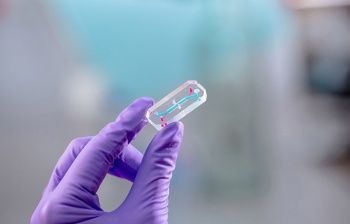What is an Organ-on-a-Chip?
 An Organ-Chip (Emulate, Inc.)
An Organ-Chip (Emulate, Inc.)An organ-on-a-chip is a bioengineered system in which key physical, chemical and biological aspects of a living organ are recreated in the laboratory to recapitulates in vivo behaviour. These 'predictive in vitro models' allow research into human health and disease and enable drugs or therapies to be tested. The development of organ-on-a-chip in vitro models has grown from a nascent idea in 2000 to one of the most promising, fastest growing research areas in the world, predicted to become a multi-billion pound industry. This technology has the potential to:
- Improve understanding of health and disease by providing better experimental models,
- Provide a more effective alternative to the current animal and cell culture models used for testing new medicines,
- Provide an opportunity to develop more precise treatments for individual patients (precision medicine) through the use of patient-specific models.
Public Engagement
The ultimate success of predictive in vitro models in areas such as drug development and personalised medicine will require engagement of all stake holders from scientists, engineers, clinicans, pharmaceutical companies, and the regulatory authorities as well as the general public.
At the Centre for Predictive in vitro Models we therefore recognise the importance of communication and engagement with the wider public. We welcome the opportunity to interact with journalists and media outlets (see press releases and news items) and are actively involved in public engagement activities around the importance and challenges of organ-on-a-chip technology and other predictive in vitro models. These include contributing to the Universities Festival of Communities, and a hugely successful 'Organ-on-a-chip shop' at the Science Museum Lates event at which visitors learnt about the cells, mechanical forces and 3D environments that need to be incorporated into different organ-chip and created their own model of a chip on a 'shrinky-dink' keyring.
Watch this nice Youtube clip from Cleo Abram for a nice overview


